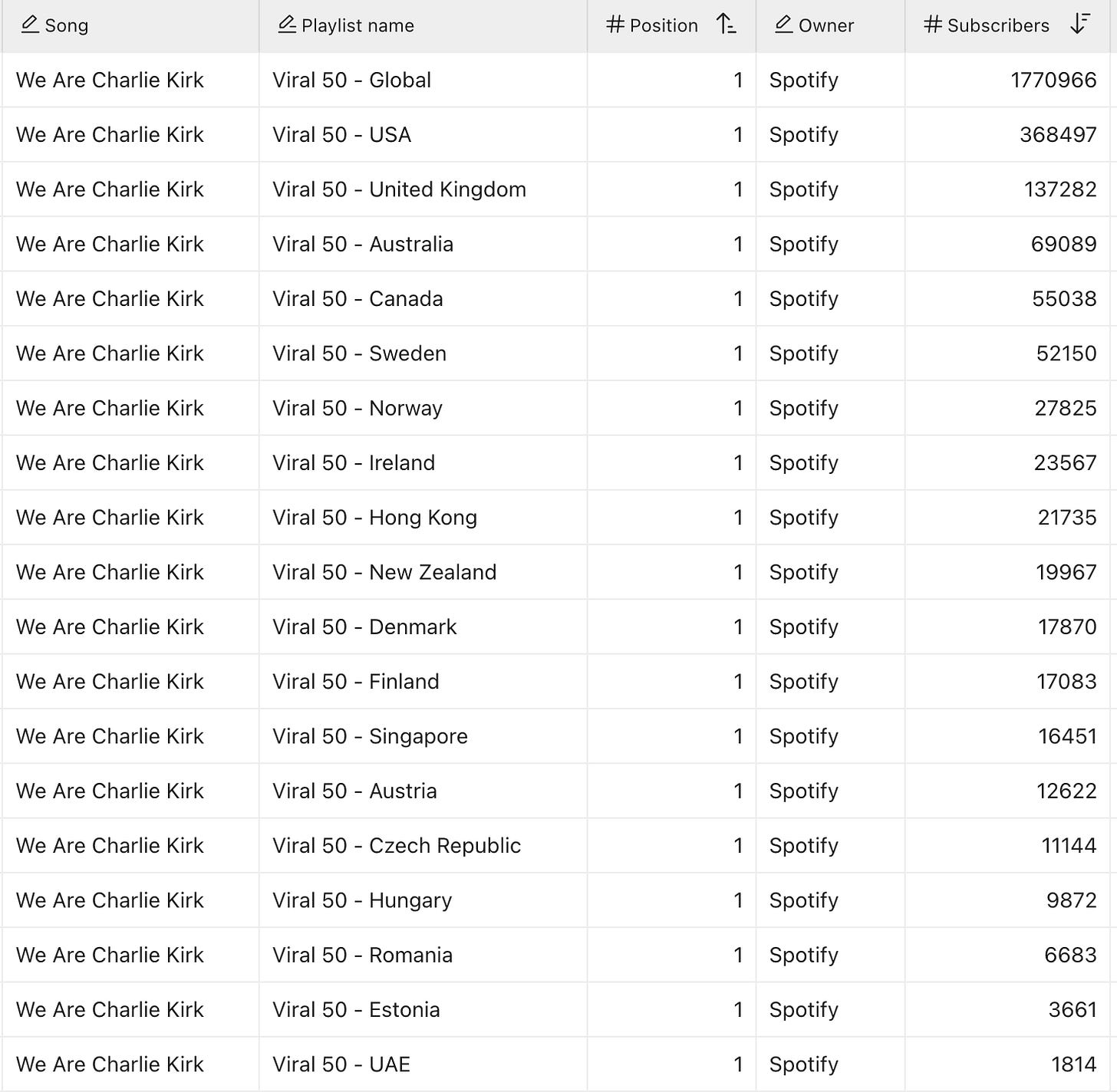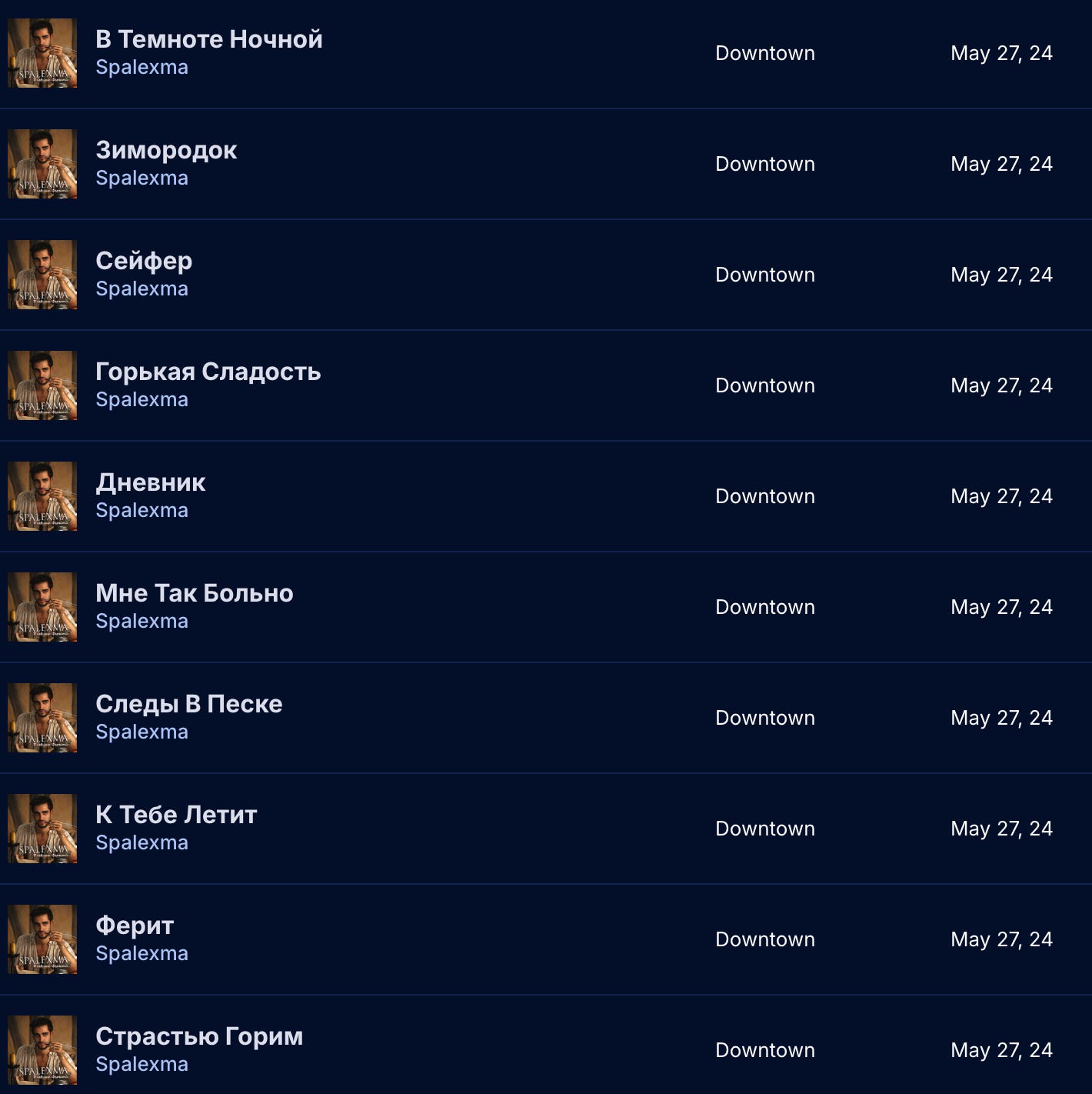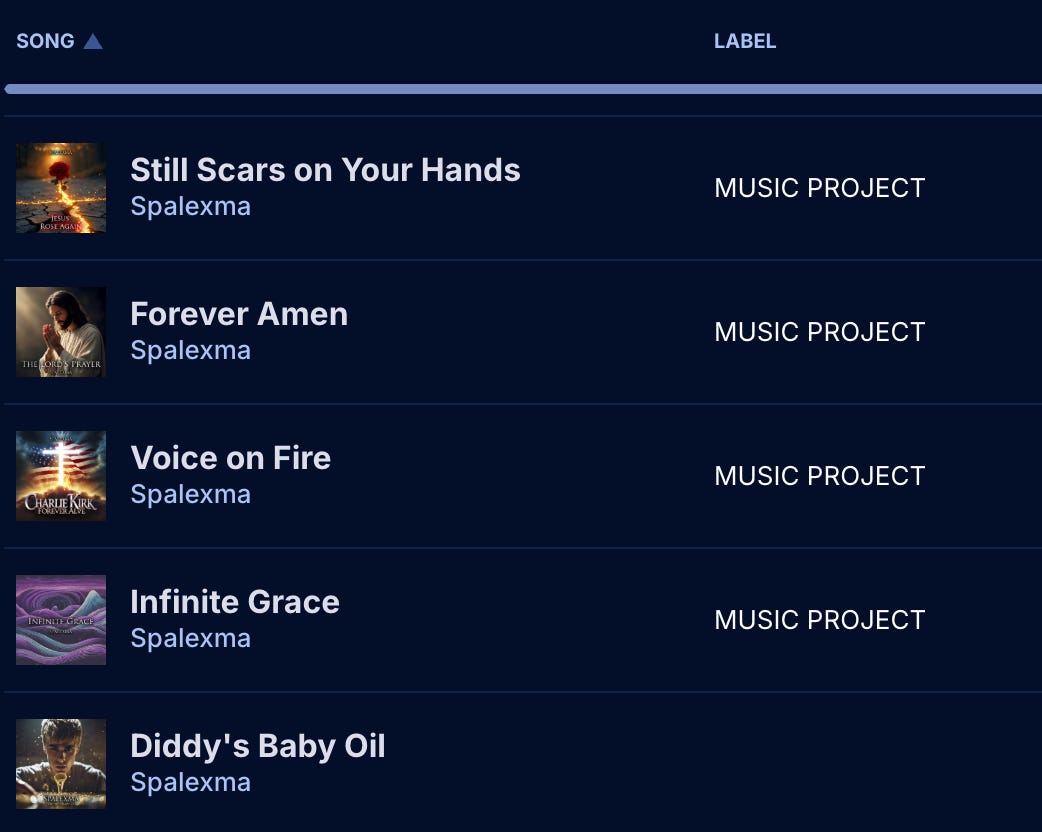🔵 Analysing the "We Are Charlie Kirk" situation
A dive into the AI-made song currently sitting at No.1 on 19 Spotify Viral charts worldwide
On November 10th I wrote about the AI-generated, far-right anti-immigration songs that were occupying much of the Netherlands’ Spotify Viral Chart. Now, it seems, we have proof that the problem is not limited to our Dutch friends.
Spalexma’s “We Are Charlie Kirk” is currently occupying the top spot in most of Spotify’s worldwide Viral charts. I therefore decided to delve into this all a little more using the very excellent Soundcharts. In doing so, all manner of questions pop up.
Let’s get started…
About the song and the artist
“We Are Charlie Kirk” is currently atop so many charts that I had to export the data to a spreadsheet just to round it all up.
Here’s a snapshot of the Spotify Viral charts where it is currently Number 1:
The song itself is an AI-generated one, courtesy of the ‘artist’ Spalexma. Spalexma has released somewhere in the region of 280 songs since December 1st 2024, when its first song, “All Alone on Christmas” was released.
What is interesting is that prior to that, Spalexma had only released 10 songs, in May 2024, all of which were in Russian:
Since then, however, songs have all been in English, and appear to have been released to capitalise on certain moments. So for example, during Christmas 2024, there was a blitz of festive-themed songs released:
Since then, songs have all been religious in theme for the most part, though if one were assuming this was all the work of a devout Christian, I’d imagine this track about Diddy’s Baby Oil might bring that into question:
In the 360 days of this year (at the time of writing) then, Spalexma has released 280 songs, which equates to one song every 1.28 days.
The quintessence of AI slop, one might argue.
So who has been distributing this? It would appear Downtown has been responsible on a limited number of occasions, but beyond that, it seems the bulk have been via Tunecore, which is now owned by Believe. Certainly “We Are Charlie Kirk” is a Tunecore track, confirmed via its YouTube video:
The questions this all raises
1. What does this say about Spotify’s platform and manipulation?
Songs like this, it is safe to say, are not getting repeated plays because the track is genuinely catchy. As with the Dutch situation previously, it feels more like the songs exist as statements. That in turn suggests that users somewhere are looking to make or amplify these statements, and that in turn tends to lead one to think these plays are not happening because people actually want to hear the song, but because they want it to chart higher and somehow ‘send a message’ to other parts of the population. A less intellectual view might simply be that this is trolling, on an epic scale.
Ultimately this reinforces the theory Bas Grasmayer put forward in his article (cross-posted last week), arguing that Spotify is becoming like the readers comments section of the music world. That is, a space for the worst and most negative elements to come through.
If we accept that to be the case, it calls into question Spotify’s own credibility, both as a platform for the artform that is music, but also in the context of its own algorithm, data and insights.
Clearly, the platform can be manipulated, and certain communities, we have to conclude, have figured out how. If the platform is that easily manipulated however, it instantly devalues the insights one is getting from it.
Put another way, would those of us in the “actual” music space genuinely argue that right now, “We Are Charlie Kirk” is a hotter track than something like Rosalia’s “Berghain”? I would argue not.
If we accept that to be true, however, that calls into question Spotify’s own data and insights, and that surely cannot be a good thing - both for Spotify itself, and the legitimate artists and labels using it for any degree of meaningful insight.
2. Where does this leave the “low value tracks” conversation?
Cast your mind back to when Lucian Grainge and others decried the low value tracks that were clogging up Spotify and other music services. At the time, this was referring more to things like white noise, rain sounds and other ‘functional’ content.
Cut to now, however, and we have a platform awash with AI slop, and now that slop is being manipulated to chart higher than the actual music, made by real humans.
Tracks like “We Are Charlie Kirk” certainly pass the “more than 1,000 plays” test that enable it to be monetised, so in that sense, it doesn’t class as “low value”. If anything though, it is a much more worrying proposition: AI-made novelty music (of a sort) that is now gaining more algorithmic traction than some of the major labels’ biggest Q4 priorities.
Much of what Grainge complained about in the MBW piece linked above relates heavily to where we are now, except that things are now much, much worse. So it might be argued that whatever new system was put in place has already been overwhelmed and broken, and that once again, this might all be in dire need of review, if - and it’s a big ‘if’, given Universal’s deal with AI-gen music company Udio - the company genuinely cares about music as a human-made artform and not an AI-gen echo chamber.
3. How does this reflect on the likes of Believe, who own Tunecore?
It would appear most of these tracks have been distributed by Tunecore, the DIY platform owned by Believe. At a point where I’d argue there’s a fundamental divide opening up between real artists and those generating AI slop, one has to wonder how the artist community feels about the fact that a company they might even be in business with themselves is now enabling and profiting from the distribution of this kind of music. I feel this is a fair question to ask, if only because I see a clear “them vs us” dynamic developing between the bulk of the artist community and those generating AI music and swamping platforms with it.
4. How does one address the problem of “culture war” output versus art?
These tracks exist almost as a kind of extension to the kind of behaviour we see on platforms like X, i.e. as highly politicised messaging designed to flood the plain with (almost entirely) right-wing content. Quite what the intentions are is unclear, but again, that is reflecting the current state of affairs - including, ironically, the assassination of Kirk himself, which appears to have been committed not by a highly radicalised political terrorist, but by a highly disturbed individual looking for internet clout and notoriety. It is almost like internet communities are simply doing this as a power move, to show they can wield sufficient influence, all whilst playing it for the LOLs, no matter how extreme and tasteless the ‘joke’ might be.
Within that then, platforms like Spotify arguably have a choice to make: either accept that this content will continue flooding the platform and up-ending algorithms and charts, or put in place some kind of controls to ensure that the service focuses on ‘proper’ music, if we define that as material which is not being played to make a statement, but enjoyed on the basis of its actual merits as a song.
In that regard, I genuinely sympathise with Spotify’s plight… to an extent. The freedom of speech issue once again raises its head here, and I would agree that simply censoring songs because they’re not authentic enough is a risky road to go down that becomes a Catch-22 for Spotify itself. Perhaps a solution lies further upstream, for example in removing purely AI-generated music altogether. Not an easy task by any measure, but a potentially achievable one nonetheless.
Fail to address these issues though, and Spotify continues a race to the bottom, one that will see AI threaten every corner of its business. AI-generated podcasts could easily flood that part of its platform, and similarly AI-made audiobooks could do the same in that respective space too. In no time at all the signal-to-noise ratio is overwhelmed and users are struggling to find anything of use. The algorithms used to address that, but how many will be thankful when Spotify gleefully recommends “We Are Charlie Kirk” in their feed?
(Sidenote: one would imagine there’s ancillary benefits to banning wholly AI-made tracks too - the sheer amount of hosting space they must take up being one.)
In conclusion…
This is a more complex issue than it might first appear to be. There is no simple solution. However as this is now happening repeatedly, it is clearly going to keep occurring until some kind of action is taken. Equally if no action is taken, one wonders whether it will be artists and/or rights holders forcing the issue.
For now though, the problem persists and shows no signs of going anywhere.
Have a great day*
D.
*after someone pointed out that when writing articles like this, that sentence almost feels sarcastic, I can assure you I really mean it!
🎶 Enjoying the Loraine James “Gentle Confrontation” album, as recommended in Cantilever. A word on that: I feel the best way to view Cantilever is not as a music service, but as a magazine subscription. Framed that way, £5 is nothing to pay for some recommendations that, whilst not always my bag, have certainly already got me enjoying a few things I’d otherwise have missed. Another sidenote: Hyperdub’s A&R is simply stunning. If I could subscribe to a label’s entire output, Hyperdub would be most likely to see me doing just that.
📺 Watching “Why the UK’s Doing Better Than You Think” on YouTube. My colleague Tom recommended this, and I needed to watch it, especially after reading through the latest UK budget, which was frankly depressing. This video acts as a (slight) tonic to that.
📖 Reading “Making Music: 74 Creative Strategies for Electronic Music Producers” by Dennis DeSantis. The title makes this sound a bit twee, but I’d argue it’s almost like a more practical take on Brian Eno’s Oblique Strategies cards. That is, 74 tips to help you break creative block, stay sharp in your creations and generally reduce the friction to creativity. A really interesting read, well worth your time if you’re a music maker.
🤖 Getting excited for Notion’s AI Agents. Notion has managed to deliver the kind of AI platform and experience most others have thus far promised but fallen short on. For us, it’s proving a brilliant addition to our software stack, and we’ve been waiting for the agents function to go live for a while now, as it will further turbo-charge what we’re doing. Can’t wait to get hands on with it!







Thanks for writing this, and letting me/us know that this track is trending.
This type of activity does make nonsense of the 'low-value track' threshold - tech-savvy manipulators can easily rack up 1000 streams in less than a day (an hour, probably). The artists that's have no idea bout marketing, or are just not listenable, are penalised by the <1000-stream threshold. (This is my opinion and that's all it is)
And I'm glad you are liking ''Making Music:74 Creative Strategies...". That's one my my faves regarding the creative process.
I'm not a huge fan of AI panels at conferences, but this would make for such an interesting discussion.